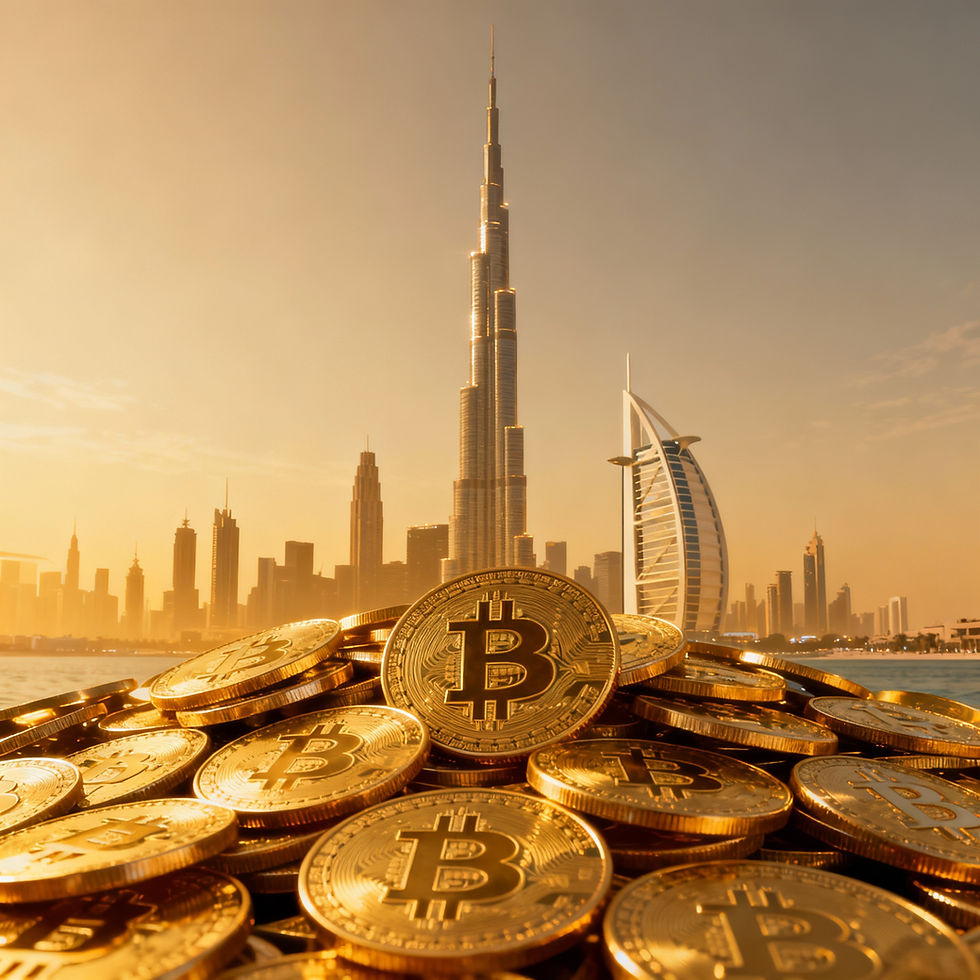Metaverse Real Estate: Why Dubai Investors Are Buying Digital Penthouses?
- Staff Writer
- Nov 8, 2025
- 3 min read
In early 2025, a luxury apartment complex in Dubai sold entirely within 60 minutes. Not a single physical brick was laid—yet developers fielded requests from buyers across 35 countries competing for fractional ownership of blockchain-based tokens representing real property shares. Welcome to Dubai's metaverse real estate revolution, where traditional property investment collides with cutting-edge blockchain technology, and the line between virtual and tangible wealth is blurring faster than ever.

The VARA Game-Changer: Dubai's Global Regulatory Leadership
Dubai's establishment of the Virtual Assets Regulatory Authority (VARA) in 2024 fundamentally transformed the city's position in the global digital economy. VARA isn't just bureaucratic window-dressing—it's the world's most progressive framework legitimizing tokenized assets, NFT marketplaces, and fractional property ownership. While major global cities remained paralyzed by regulatory uncertainty, Dubai positioned itself as the permissive but prudent hub for digital asset innovation.
The impact is staggering: by 2033, Dubai targets 7% of its entire real estate market (worth approximately USD 16 billion) to become tokenized. This isn't speculative futurism—it's government-backed infrastructure and financial engineering.
Understanding Tokenized Real Estate: Breaking the Luxury Barrier
Traditionally, real estate investment demanded substantial capital upfront. A AED 3 million luxury villa in Dubai? You need the full amount. Enter asset tokenization: that identical villa is now divisible into 30,000 digital tokens (NFTs), each representing fractional ownership. Individual investors can purchase 10, 100, or 1,000 tokens, instantly democratizing access to premium properties previously reserved for ultra-high-net-worth individuals.
The financial mechanics matter: fractional ownership eliminates the traditional all-or-nothing barrier. A middle-class investor from India or Pakistan can now own a quantifiable share of Jumeirah beachfront property, collect proportional rental yields, and trade their stake on blockchain-native marketplaces—without navigating complex international real estate law.
Why This Matters: Liquidity Meets Luxury
Traditional Dubai real estate demands patience. Selling a villa typically requires 3–12 months of listing, negotiation, legal processing, and escrow delays. Blockchain-tokenized properties transform this paradigm: your fractional ownership can be traded on decentralized exchanges within minutes, converting previously illiquid assets into liquid investments comparable to stock trading.
For investors, this means portfolio rebalancing without months of legal entanglement. You hold a tokenized share of a Burj Khalifa-view apartment and want to diversify into Ras Al Khaimah beachfront? Execute the transaction in real-time.
The Metaverse Layer: Digital-First Investment
Beyond tokenizing physical properties, Dubai's metaverse ecosystem introduces purely digital real estate—virtual plots within blockchain-based worlds like Decentraland and The Sandbox. These aren't gimmicks; they're functioning economic ecosystems where virtual land generates real revenue through rental income, business operations, and event hosting.
A Dubai entrepreneur purchased virtual land in Decentraland's "Fashion District" for AED 500,000 in 2024. Within six months, demand for adjacent parcels drove the value to AED 1.2 million. The profit mechanism is identical to traditional real estate: location, scarcity, and utility drive appreciation.
Investment Mechanics: Fractional Ownership Models
Tier 1 (Entry Level): AED 10,000–50,000 buys fractional tokens representing micro-stakes in premium Dubai properties. Rental yields: 5–7% annually.
Tier 2 (Serious Investors): AED 100,000–500,000 acquires meaningful ownership percentages (5–25% stakes) in luxury commercial or residential complexes. Yields climb to 6–8% with higher appreciation potential.
Tier 3 (Portfolio Players): AED 500,000+ enables substantial ownership (40%+ stakes), board-level decision participation, and direct revenue management. Returns often exceed 8–12% when combined with property appreciation.
The Regulatory Protection: VARA's Oversight
VARA operates strict compliance frameworks: all platforms must maintain customer asset segregation, submit to quarterly audits, implement Know-Your-Customer (KYC) protocols, and enforce transaction transparency. This isn't the Wild West—it's regulated innovation with built-in investor protection mechanisms that exceed those in traditional real estate markets.
The Risks You Must Understand
Blockchain volatility is real. If cryptocurrency markets crash, tokenized property liquidity can evaporate temporarily. Additionally, the technology remains nascent—platform failures, smart contract bugs, and regulatory shifts pose genuine risks. Conservative investors should allocate no more than 5–10% of investment portfolios to this space initially.
Dubai's metaverse real estate market represents the intersection of financial democratization, technological innovation, and pragmatic government policy. Whether you're a speculative tech investor seeking 12-month explosive returns or a conservative wealth-preserver wanting fractional stakes in trophy properties, this ecosystem now offers legitimate pathways previously unavailable.
The crypto cynics who dismissed blockchain in 2020 now watch from the sidelines as Dubai transforms $16 billion in real estate into liquid, tradeable, globally accessible digital assets. The revolution isn't coming—it's already trading on Ethereum.



Comments